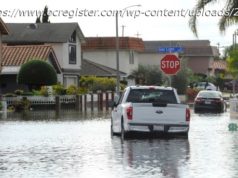NEW YORK (AP) – How many people died in Puerto Rico from Hurricane Maria? It’s a question that has been debated since the powerful storm…
NEW YORK (AP) – How many people died in Puerto Rico from Hurricane Maria?
It’s a question that has been debated since the powerful storm slammed into the island and devastated the U. S. territory last year. It’s also raised questions about how officials go about the challenging task of counting deaths and deciding what criteria to use.
Someone who is killed by a storm-toppled tree, yes. But someone electrocuted by downed power lines many days later?
No government agency has a good handle on counting disaster deaths, said George Haddow, a former official with the Federal Emergency Management Agency who teaches disaster operations at Tulane University in New Orleans.
« Everybody counts it differently, » Haddow said.
Two bills were introduced in Congress this week in an attempt to establish a new standard for counting deaths after a natural disaster.
« Death tolls are important. They influence public perception about the scope of a disaster and often determine what federal resources are allocated for response, » said U. S. Rep. Nydia M. Velázquez, D-NY, in a statement. She introduced the House version of the bill.
Some basics about counting disaster deaths and why it’s an issue now:
HOW ARE HURRICANE-RELATED DEATHS COUNTED?
Disaster deaths tend to be placed in two categories, « direct » and « indirect. » For a hurricane, direct deaths include people who drown in a storm surge or flooding, are hit by flying debris or crushed in a wind-toppled building. Indirect deaths include heart attacks, house fires, electrocutions from downed power lines, car accidents and others fatalities that are less clearly tied to the elements.
The National Hurricane Center, when it gives hurricane tallies, only reports direct deaths. But some experts disagree with that. « If you’re looking at people who died from the fact that their dialysis equipment didn’t work or their respirators didn’t work because of power failures, and they wouldn’t have died otherwise, I think those deaths could – and should – be counted, » said Kathleen Tierney, director of the University of Colorado’s Natural Hazards Center.
WHERE DO DEATH REPORTS COME FROM?
Death certificates are the primary source of official death statistics in the United States, but those can take time and don’t always include the circumstances of a death. Reports from police and emergency managers can also count as official information. To try to get a broader picture, some researchers have surveyed storm survivors, funeral home directors, and hospitals or other health care facilities. « Different methodologies are going to yield different numbers, » said Tierney.
WHAT HAPPENED IN PUERTO RICO?
Hurricane Maria hit in September 2017 and caused extensive damage, leaving the entire island of 3.3 million people without power. The official death toll stands at 64 although authorities believe more died. In December, Puerto Rico’s governor ordered a review, and in February he announced a team at George Washington University would lead the review and provide an estimated range of deaths. That estimate is still pending.
A judge last week ordered Puerto Rico to release more information, including all death certificates issued after the hurricane. « People still don’t have a clear picture as to how many lives were lost due to a lack of food, medicine, health services or simply because of an ineffective response to an emergency, » wrote Judge Lauracelis Roques.
ARE THERE OTHER ESTIMATES?
Since the storm, a number of academic researchers and news organizations have made their own attempts to estimate the toll. Doing an exact count is all but impossible. Instead, they tried to estimate how many deaths occurred beyond what is usually seen in the same time period in the past. They believe that these « excess deaths » reflect direct and indirect hurricane-related deaths.
Several offered an estimate of around 1,000 more deaths than usual in the months after the storm, and a Harvard study published last month suggested the number could be as high as 4,600 or more.
Last week, Puerto Rico’s Health Department offered its own estimate: It said there were 1,397 more deaths from September to December in 2017 than in the same period in 2016. Tuesday, authorities released the death totals for 2013-2017. Taking into account the newly released data, there were 1,427 more deaths than the average for the same four-month period in the previous four years.
___
Science Writer Seth Borenstein contributed from Washington.
___
The Associated Press Health & Science Department receives support from the Howard Hughes Medical Institute’s Department of Science Education. The AP is solely responsible for all content.
Copyright 2018 The Associated Press. All rights reserved. This material may not be published, broadcast, rewritten or redistributed.






